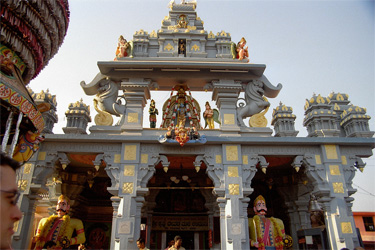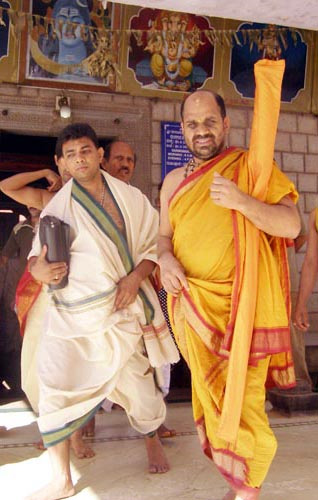
The following questions were put before Sri Sugunendra Theertha Swamji of Udupi Puthige Matha (of the Madhva Sampradaya) by devotees during his visit to Detroit.
Question One:
Plants are also having life, so killing plants should also be a sin. Thus in what way is vegetarian food better than non-vegetarian food in terms of killing or committing "sin"?
Answer by Sugunendra Theertha Swamiji:
This is a very good question. It is true that plants also have "life" and killing plants is also sin. So the best way to observe total non-violence is to follow "Shiloncha Vraththi". That is to take only those fruits which have naturally fallen from the trees or plants. In this way we are doing harm to no one. But everyone can not follow that vow. We have to take food in order to survive and sustain this body. It is a necessity of survival. But we need to take that path which is less sinful and does less harm to other jivas
living entities'); return false">jivas (living entities).
Now there are two reasons to say that vegetarian food is having insignificant sin. Many of the plants like rice, wheat, etc., are having life only for one crop time. Once their yield is over, they die naturally, even if we don't cut them. So by cutting those plants (which have already died) we are doing less sin or no sin at all. In many other plants, like mango, coconut, etc., by plucking the fruit, we are not killing the plants, and so we are doing very minimal sin or no sin at all. So vegetarian food is less sinful. More over, it is inevitable for our survival, but non-vegetarian food is a luxury to us and we can survive even if we avoid that. It is more sinful since we need to kill animals all of the time.
Next we need to know why certain acts are sinful. Each and every life (whether plant, animal, or human) has come to this world to do "sadhana
daily spiritual practices and vows'); return false">sadhana" (spiritual practices), so that they may get a better birth next life and finally get "moksha
liberation from the cycle of birth and death'); return false">moksha" (liberation). Whenever such "sadhana" opportunities are cut short, it becomes a sin. For plants there is not much "sadhana" available to them. They can not do any kind of physical or mental activities in terms of "sadhana". So by cutting them, we are not doing much harm to their "sadhana" or reducing their opportunity for "sadhana" (spiritual practice). So it is not so sinful. But animals can do a good amount of "sadhana" by means of physical and mental activities. By killing them, we are cutting short their opportunities to do "sadhana" towards their liberation (moksha). Thus it is much more sinful.
To support this aspect further I will give an example. "Suicide" is considered as the greatest sin, even though no one else is troubled other than the one individual, because God has given us this wonderful body and mind to do "sadhana" by which we work towards moksha. By rejecting this offer or by cutting short this "sadhana", we are insulting God and betraying him. Thus suicide is considered highly sinful. There is another example in the scriptures I would like to cite. Suppose there is a very, very old man, incapable of doing any physical and mental activities. Then according to the scriptures he can enter into fire to end his life. That is not considered a sin because he cannot do any more "sadhana" by himself or through others. So in general, any act which is cutting short our, or others', "sadhana" is considered as a sin. Thus from this angle, vegetarians are committing less sins than those who eat meat.
Question Two:
We were thinking that only human beings have thinking ability, and thus only they can do "sadhana" (spiritual practices), but that other animals could not. Is this concept false? How can animals do "sadhana"?
Answer by Sugunendra Theertha Swamiji:
This is not true. All animals can also do "sadhana" (spiritual practices). Otherwise there is a fundamental problem in the universal system. If animals cannot do "sadhana", they can not get better lives, which lead to the human life. If they can not get a human life, then they can not get moksha (liberation) at all at any time. This is not true, thus it is proven that animals also do "sadhana" and get better lives.
They do "sadhana" by their mental activities. We can see a lot of differences in the behaviors of various animals. In the same category of, say cat, dog or cow, we can see a lot of difference between two animals. For example some are soft, some are sensitive, some are more active, etc. This is due to their mental "sadhana". Also in children, who are not having developed thinking power, we can see many differences. We have seen a child, in Bombay, around 2 years old. He loves Krishna like anything. While sleeping, he tightly hugs a Krishna idol. He does not drink milk without offering to Krishna. He always wants to listen to Krishna's stories. He always wants to see the puja
a ritual worship ceremony'); return false">puja of Krishna. It is really amazing to witness. This is all due to previous "samskara" (purification). Like this, animals also will have their own previous samskara and "sadhana".
Question Three:
Is it true that in olden days, the sages used to eat meat? There is an incident of Agasthya Muni eating meat in the "Vathapi - Ilvala" story.
Answer by Sugunendra Theertha Swamiji:
Yes, we can see some mention about such things in very old stories. We need to understand clearly why and under what circumstances they used to consume meat. Firstly, they used to take meat, but not as their regular food. The animal would be offered to 'yajna
a sacrifice, generally referring to the offering of sacrificial oblations of ghee into a sacred fire'); return false">yajna', the sacred fire, and then the sages, having very high yogic power, would consume the meat as a prasada of the yajna. Due to this auspicious activity (of yajna), the animal would go to the heavens. In the story of Agusthya Muni, when he said ' vathapi jirno bhava', he was digested immediately. Such was the power of the sages in those days.
But today meat is not approved for religious people such as brahmanas
One of the four natural divisions of society, which refers to the spiritualists. In later times it came to refer to a caste determined by birth.'); return false">brahmanas. First we need to understand why we consume food. It is to have good health. Health means not only the physical health, but the mental health also plays a very important role. That's why in Sanskrit it is known as "swasthya", which means mental peace, purity and health. Meat or non-vegetarian food improves the body, but not the mind. So for those people who need to have physical strength, like soldiers, meat is not prohibited. Soldiers do not need to have as much thinking power. They have to fight like machines. But for spiritual people such as brahmanas, mental power is the more important. We need to have peace and purity of mind, stability and concentration of mind. For such people meat is prohibited. Since ages our ancestors were eating vegetarian food, and so brahmanas are generally considered as soft, kind hearted, stable and intelligent people. If we start consuming meat, slowly we will loose all these good qualities. We will not see these negative changes overnight. It takes time but we will see the changes clearly in the later generations.
Question Four:
There are many noble laureates who are meat eaters. How can we explain that?
Answer by Sugunendra Theertha Swamiji:
Getting a noble prize is not at all a yardstick to measure the peace and purity, stability and concentration of someone's mind. It is known that the suicide rate is high in scientists as well. Actually scientists are more disturbed in their mind. Due to this, they get activated and get involved deeply in something and come out with some new concepts or ideas. For their success, the basic reason is not the peaceful mind, but their disturbed mind. Generally brahmanas who are suppose to have the mental capacity to understand "brahman" (God), need to have a very good concentration power for performing "japa
a spiritual practice involving the meditative repetition of a mantra or name of God'); return false">japa" (mantra
a sound, syllable, word, or group of words that manifest spiritual power when chanted'); return false">mantra chanting) and "tapa
austerities or penance'); return false">tapa" (austerities). They are supposed to be people who are not mentally disturbed. In olden days even if they consumed meat, they used to keep up their mental stability and peace of mind due to their yogic power or "tapas" (severe austerity). But now in the present age of kali-yuga
the present cosmic age of chaos which lasts 432,000 years'); return false">kali-yuga, our mental powers and concentration powers are getting reduced. We are loosing our purity and peace of mind due to various reasons. As such, the sattvic
the quality of goodness or purity'); return false">sattvic atmosphere and sattvic qualities are reducing because we are not doing enough japa, tapa, etc. So if we start consuming meat we will loose all our good mental qualities very quickly. In kaliyuga, meat is strictly prohibited for brahmanas. It is also sinful for all people, as mentioned in the previous answers.
Question Five:
Is it not a sin to kill silkworms for silk cloth, or to kill deers for making deer skin meditation mats?
Answer by Sugunendra Theertha Swamiji:
The short answer is that it is a sin if we do it for trading purposes. For a detailed answer, first we need to understand what is sin. It is not a substance associated with a particular activity. The same activity can result in either sin or no sin depending upon the purpose, intention and circumstance. For example, killing in general is a sin, but killing a demon or murderer is not a sin. Similarly, in olden days kings used to go for hunting. It was not considered a sin because they used to kill only those wild animals which were troublesome to the sages and the nearby villagers. Similarly if we kill animals to avoid being killed, it is not a sin. As said earlier, every creature in this world is here for doing "sadhana". In this world the priority is for those who are doing greater "sadhana". To accomplish that, if others have to sacrifice their "sadhana", there is no harm in that. For example, assume that there are two students in a house. One is preparing for second grade and the other is preparing for a college medical exam. Though both are preparing for their exams, we consider that the medical exam is more important and give preference to him. If needed, we may ask the other student to sacrifice his preparation, because he will not lose much. Similarly, in this world, the living entity who is doing a higher level of sadhana, gets preference. So for the benefit of the higher sadhana, others performing lesser sadhana may be sacrificed without any sin. If we are preparing silk for God's pooja, then it is not a sin. But if we are preparing silk for decorating ourselves, then it is a sin. So we need to understand what is the purpose of the action, and what is going to be achieved finally.

Source :- http://www.indiadivine.org/

















0 comments:
Post a Comment